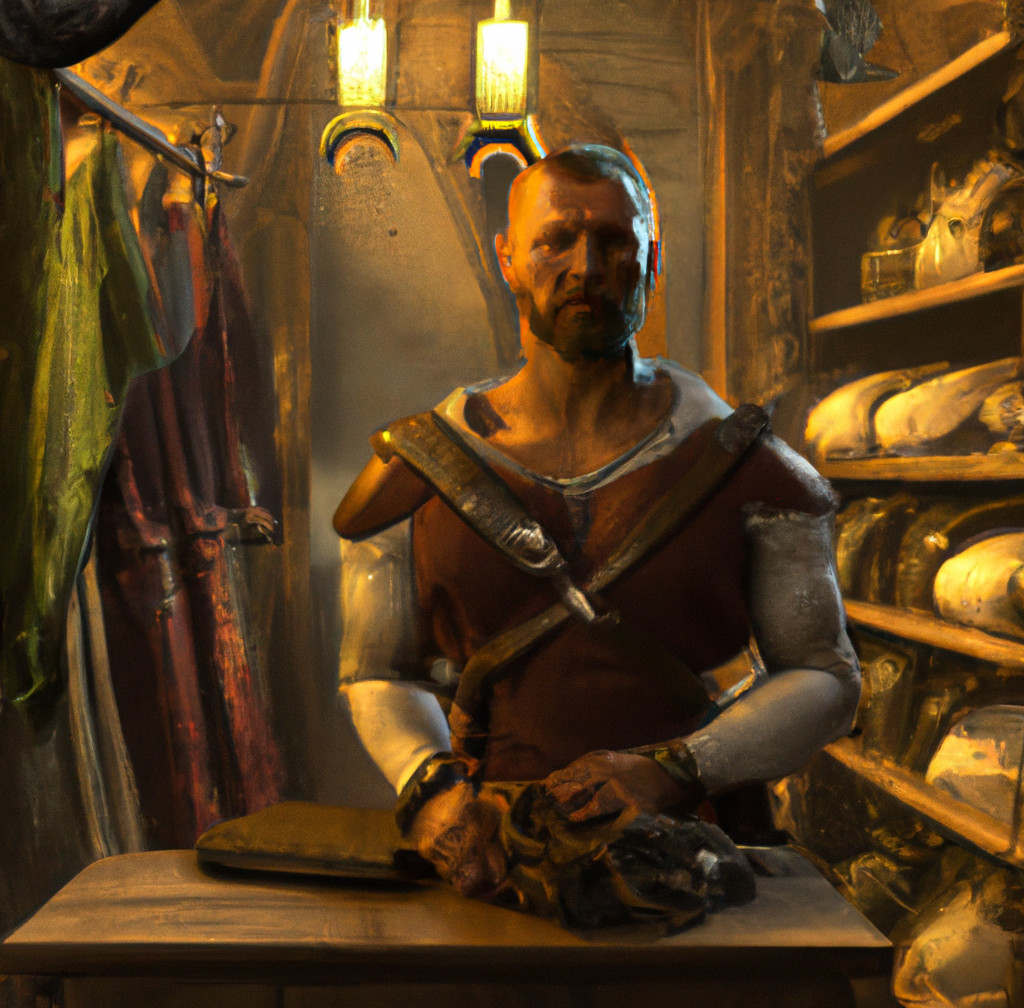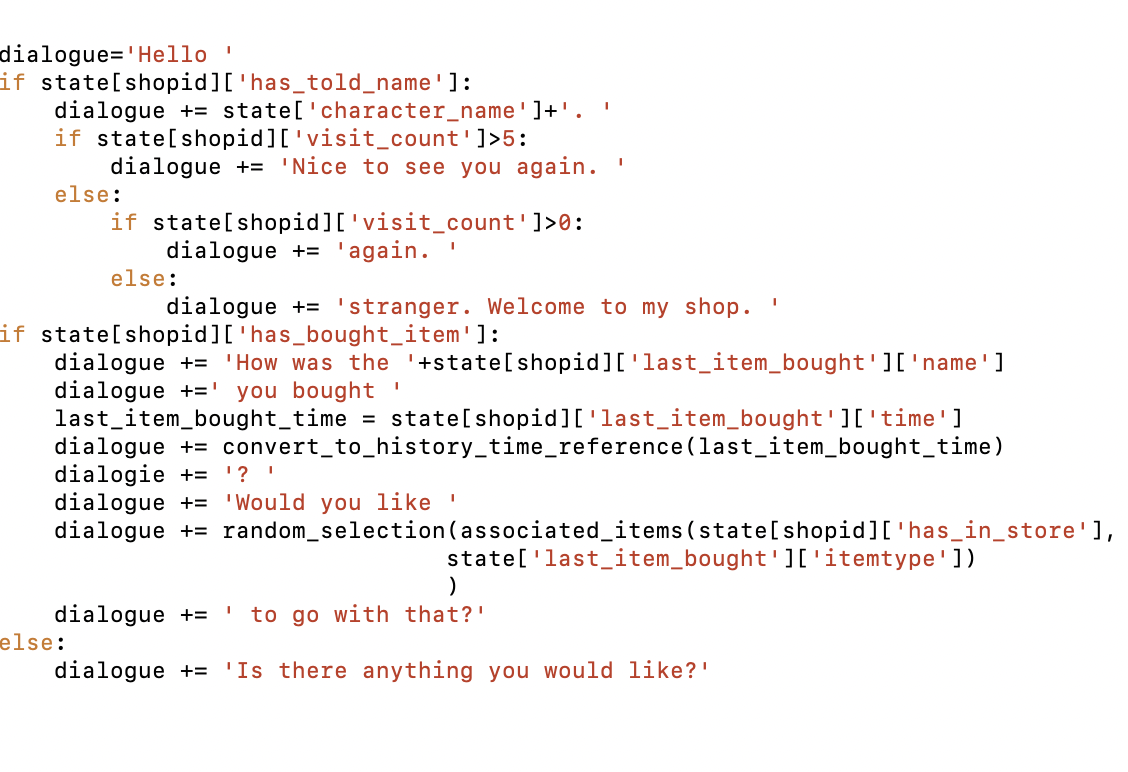This is an example of a fantasy role playing game where we compare prerecorded audio with a simple Lingotion implementation:
When entering a shop to buy more equipment the NPC shopkeeper comes forward and says something like “Hello Stranger. Welcome to my shop. Is there anything you would like?” which is OK when you encounter the shopkeeper the first time.
The problem is that you will hear the same dialogue every time, so when you visit the shop for the twentieth time the shopkeeper will still say “Hello Stranger. Welcome to my shop. Is there anything you would like?”.
This breaks the immersion effect because if it would be a real human, you would not be a stranger after buying twenty times and a real shopkeeper would vary the dialogue every time you visit. By having the shopkeeper saying the same thing every time (or in best case varies between a couple of versions) it becomes glaring obvious that the shopkeeper is a robot.





When using Lingotion you can for example create template based scripts so you can create a dynamic dialogue in real-time based on the current game state. So when using Lingotion the shopkeepers welcome dialogue would be:
“Hello Adam. How was the armor you bought yesterday? Would you like a helmet to go with that?”
“Hej Adam. Hur är rustningen som du köpte igår? Vill du ha en hjälm som matchar?” (Note: audio in Swedish.)
What we are actually doing here is scripting the dialogue using logic and templates, and then Lingotion will synthesize a realistic human character for the entire sentence with a realistic sentence melody and emotional expression of joy (The shopkeeper expresses joy because he has previously made money selling something to you and you are now a returning customer).
This extremely simple script template will result in thousands of different welcoming phrases spoken by the shopkeeper depending on:
• How many times you have visited store before
• If you have told the shopkeeper your name
• Have you bought anything previously
• What did you buy last time
• When did you buy it
• What other items would go well with the item you bought last time, and then offer
• Whatever you can imagine the shopkeeper will say or even use a robot AI that generates an infinite amount dialogue.

The example above is only a simple script that is easily extended with comments on weather, rumors, jokes, hearing about your latest quest etc that are randomly added and based on game states.
So next time the shop keeper will welcome you with:
“Hello Adam. Nice to see you again. How was the helmet you bought yesterday? Would you like a sword to go with that?”
“Hej Adam. Roligt att se dig igen. Hur är hjälmen som du köpte igår? Vill du ha ett svärd som matchar?” (Note: audio in Swedish.)
And the shop keeper will say that with joy in the voice since you are a returning paying customer and he anticipates more business coming from you.
And then you suddenly decide to steal something from the shop and the shopkeeper immediately says with an angry voice:
“Adam! What are you doing! You are a good and honest customer. Why have you started stealing?”
“ Adam! Vad sysslar du med! Du är ju en bra och ärlig kund. Varför har du börjat stjäla?” (Note: audio in Swedish.)
With Lingotion the shopkeeper becomes a living interactive character that behaves, speaks and sounds more like a real human. Lingotion will allow you to create an unprecedented realistic immersion effect compared to using prerecorded audio files.
Lingotion AB is a Swedish tech startup specializing in the forefront of AI research.
Contact
To contact us please send an email to:
sales@lingotion.com
Address
Lingotion AB
Klostergatan 1G
222 22 Lund, Sweden
Terms of Service
View our Terms of Service
© Lingotion AB. All Rights Reserved.
| Cookie | Duration | Description |
|---|---|---|
| cookielawinfo-checkbox-analytics | 11 months | This cookie is set by GDPR Cookie Consent plugin. The cookie is used to store the user consent for the cookies in the category "Analytics". |
| cookielawinfo-checkbox-functional | 11 months | The cookie is set by GDPR cookie consent to record the user consent for the cookies in the category "Functional". |
| cookielawinfo-checkbox-necessary | 11 months | This cookie is set by GDPR Cookie Consent plugin. The cookies is used to store the user consent for the cookies in the category "Necessary". |
| cookielawinfo-checkbox-others | 11 months | This cookie is set by GDPR Cookie Consent plugin. The cookie is used to store the user consent for the cookies in the category "Other. |
| cookielawinfo-checkbox-performance | 11 months | This cookie is set by GDPR Cookie Consent plugin. The cookie is used to store the user consent for the cookies in the category "Performance". |
| viewed_cookie_policy | 11 months | The cookie is set by the GDPR Cookie Consent plugin and is used to store whether or not user has consented to the use of cookies. It does not store any personal data. |